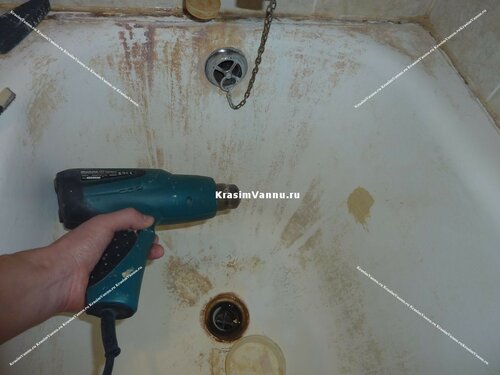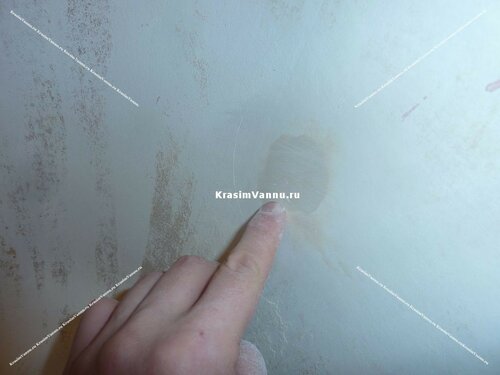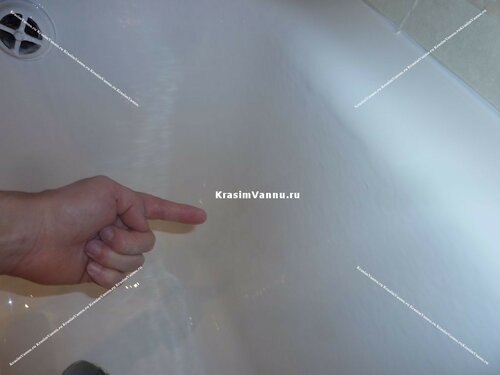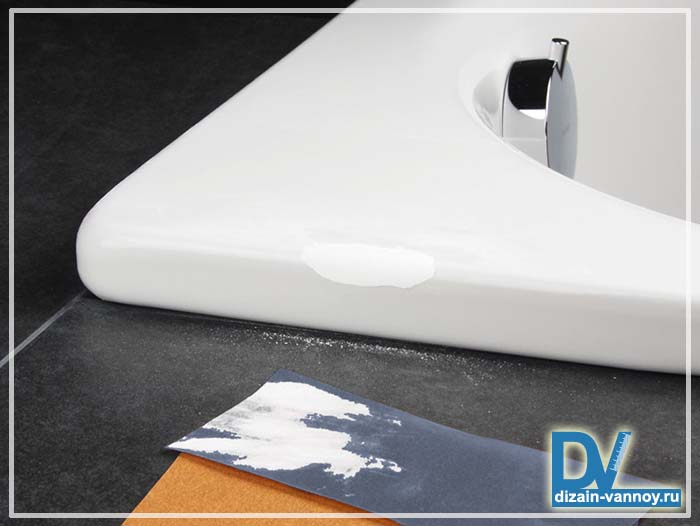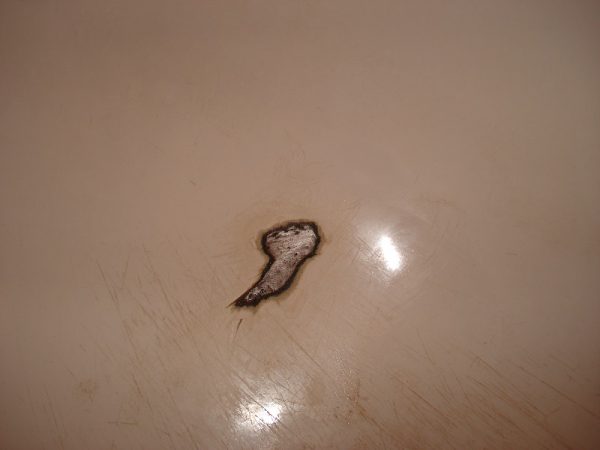In detail: DIY repair of chips in the bathroom from a real master for the site my.housecope.com.
What to do if a chip appears in the bathtub? Often this happens during repairs, at home or at the facility, a tile or a hammer accidentally falls. Or, during transportation, a new bathtub will hit the wall or doorframe and a piece of enamel falls off. It's a shame.
But be that as it may. There was a misfortune. How to remove the chip? I don't want to enamel the bath because of one chip, and even more so to install the insert or buy a new one.
We must soberly understand that the partially repaired chips on the bathtub with repair kits, although not much, will still differ from the rest, the factory coating of the bath enamel. There are many shades of white. It is impossible to find perfect shades in midtones. This is one of the reasons why our craftsmen do not want to take on such work. The second reason is strength. Unfortunately, no matter how hard you try, with local restoration of the chip in that place, the bath will not be as strong. Almost the original strength is guaranteed only by a complete restoration of the bath with acrylic, or at least enamel.
But still, for those who want to patch up only the chip at all costs, we will give a recommendation, and for complete openness, we will post it here.
In the first method, you buy ready repair kit which includes everything for sealing the chip (putty, sandpaper) and subsequent painting (aerosol can with special enamel).
In it you Assemble the Repair Kit yourself for repairing a chip in the bathroom (using car putty, acetone, etc.) by purchasing the necessary materials in ordinary household goods stores.
In it you Order a service to seal the chip together with the subsequent restoration of the enamel in the entire bath. The method of complete removal of chips in the bath. So that not a trace could be seen.
| Video (click to play). |
Domestic products are rich in inventing all kinds of kits for "homemade". And demand, as you know, gives rise to supply.
Proposals from Russian manufacturers may not be of the worst quality, but due to the lack of any control and intelligible certification, they do not inspire confidence.
Perhaps anyone who believes in the altruism and honesty of our businessmen can look for similar analogues. In this article, I will cite the most respected manufacturer of products for the restoration of household bathtubs, which produces a kit for self-repairing chips in bathtubs under the Cramer brand. Cramer Company A German company dealing exclusively with products for the restoration of defects in plumbing.
So welcome. Set "Keramik-Email-Acryl Reparatur-Set"
- the putty mixture itself (in the photo there is an iron jar and a plastic tube).
- A spatula for mixing the putty with hardener.
- Sandpaper, 2 types for acrylic (gray) and for enamels (brown).
- Well, a spray with special enamel. Suitable for coating ceramic, enamel and acrylic bathtubs.
We get it all out of the box and proceed to seal the chip, if you are interested in the instructions below under the spoiler.
First of all, we clean the chip.
Not just washed with washing powder, but thoroughly clean all the dirt from there, if there is rust inside, then we also remove it. It is advisable to fill the cleavage site with Sanox toilets cleaner and wait until its active components slightly “corrode” the cleavage site.
After washing with Sanox, degrease the chip with plain baking soda and dry.
If there is Acetone at home, do not regret it and treat the chip with it.
The contents of a tin can (putty) and a plastic tube (hardener) must be mixed with each other in a ratio of 30: 1.
In order to make it easier to understand, measure the putty the size of a walnut, and the hardener the size of a pea. Measure by half a nut and a pea depending on the size of the chip.
Keep in mind. In this case less hardener is better than excess.
After mixing thoroughly, apply the mixture evenly over the chip.
Wait half an hour, and sand the putty with sandpaper. Do not give special advice here, just make sure that you do not feel the transition between the bathtub and the putty with your fingers. As the builders say “flush”. Use gray sandpaper if you have an acrylic bathtub, brown if you have an enamel bathtub.
Here I think everything is also clear. From a distance of 15 - 20 cm. Spray on the cleavage site. It is better if you use a stencil for this.
Do not try to paint over the area of the chip in one “pass”, spray the aerosol at intervals of 1-3 minutes. Layer by layer.
When you stop distinguishing colors between the bathroom and the place of the chip, this means the end of the repair.
After 2 hours, the bath can be touched with your hand. And the enamel will dry completely in 48 hours. But keep in mind, the instructions only require you to use the bathroom after 4 days.
By the way, this set can hide the chip not only in the bath, it can be used to patch up the chips in the sink, washbasin and even, as the manufacturer claims, on the kitchen stove.
In order to clean the chip of dirt and so-called “soap” (a thin layer of fat from dried soap, shampoo), we need a detergent.
We buy one of the most budgetary funds "Sanox" its price for August 2016 is about 50 rubles. It contains oxalic acid and is good at corroding rust.
Plain, baking soda.
Acetone.
It is with her that you will patch up the chip in the bath. There are no fundamental requirements for it. If there are only a couple of chips on the bathtub, then it is better to choose a smaller tube and preferably the lightest color so that the dark color does not show through the new enamel of the bathtub. (cost 50-90 rubles).
It is believed that fiberglass putty keeps the temperature better. Personally, when we close up chips in the bath, we use just this, but such a putty is a little more expensive.
Use the cheapest sandpaper. Special quality is not required for it, it is needed to grind the putty “flush” with the bath, and it is soft. A couple of leaves will be enough to repair one chip in the bath. One is 80 grit, the other is slightly smaller. It makes no sense to take moisture-proof paper, take a simple one. (18-20 p.)
Bath enamel
Bath enamels come in different sizes, of course, to seal one or two chips, you do not need a liter jar of the "Reafleks50" type or a bucket of "liquid acrylic". So you go to a plumbing store and ask for enamels for patching up chips. They are sold in small tubes, just enough for 3-4 chips. For clarity, there are several such sets in the photo below:
Among the presented enamels, the best is the enamel of the company "Rust-Oleum" "Tub & Tile" (in the photo it is green on the right). True, and the price of this set is about 900 rubles (this is in the Moscow Leroy Merlin).
How to putty the chip and paint over it will be shown below.
The only drawback of these two methods of sealing a crack or chip in the bathroom is that no matter how hard you try, the place of the chip will still be visible. Not much, but it will still be noticeable. Below you can see a couple of photo examples, as far as it can be seen:
In the photo above, the chip was repaired with a repair kit with aerosol enamel. The first thing that can be seen is that the chip itself is well putty, another thing is that the color of the enamel did not match the color of the factory coating of the bath. From this it is clearly visible.
In this photo, the bathtub was painted over with enamel with a brush. Everything is exactly the same as in the first photo. The color of the enamel did not match the original color of the enamel. And this happens in almost 9 cases out of 10.That is why we recommend this method only to those people who are doing a bath. for yourself... That is, they are responsible for their work.
If the bathtub is new, or you are a master and you need to rent the object, then this method will absolutely not work for you, because it will be noticeable. Only the third and last method can help you - read about it below.
Photo one: So. There is a bathtub with a chip on it. The chip is big and dirty. We must do something with him.
First of all, we wash everything from dirt and rust. We clean it so that the inside of the chip is as clean as possible. Pour a little "Sanox" into the cleavage and clean it thoroughly with sandpaper. Then rinse off well with water and soda (quench the acid so that its particles do not remain under the layer of putty.
The chip was washed out. Ok, we dry.
There is a time - rinse the cleavage abundantly with boiling water and wait until the water evaporates and the cleavage dries up, if there is a hairdryer, dry it with it - save time.
Now we dry the putty. Minutes 20 - 30 and the putty will be ready for cleaning
It happens that the first time the putty does not align perfectly, but there are “grooves” in it. It's not scary, just apply another layer of putty.
Remember, the smoother you sand the putty in the bathroom, the smoother the place will be. So it will not be noticeable at all.
Finally, cover the entire bathroom with a new layer of enamel. Exactly the whole... Only this method guarantees absolute "evenness" of the color.
Each bathtub cannot last forever; over time, various kinds of problems and troubles form, and you must either change the bowl or deal with the damage yourself. But, as is often the case, finances do not allow buying a new font, because a chip in the bathroom, cracks or rusty spots have to be removed on our own.
But first, you need to figure out what types of problems exist and only then think about how to remove a chip on the bathtub, close up a gap or a hole and, in general, what you need to have on hand "just in case."
Baths are available in cast iron, acrylic, steel, wood, glass or natural / artificial stone. But if wood, glass or marble are practically inaccessible for restoration on their own (this is an exclusive product and it is best not to spoil the bowl), then the first three types of bowls are the most popular. We will deal with them.
- Chipped enamel coating. This is the most common and low-effort problem. But the main thing is to prevent the growth of the gap and close it right away.
- Rust. It can appear on almost any surface, regardless of material.
- Scratch. Most often found in cast iron and acrylic bathtubs. Acrylic scratches are more terrible, as they are of different depths and can lead to breakage of the walls or bottom.
- Split. This is the "problem" of acrylic bowls with too thin walls or bottom.
- Through hole. It happens in all types of fonts, but if chips and cracks can be repaired with your own hands, then in case of holes, only professional restoration or an insert in the bath will help.
It is quite easy to get a chip of enamel on the bathroom, a slight physical impact (especially in the case of steel bowls) and now a piece of the coating has already flown off. If you do not seal it right away, you can get further corrosion of the material and, as a result, damage the entire bowl.
Advice! It is especially important to repair the chipped acrylic bath enamel! Any cavity instantly leads to the penetration of moisture into the material and the subsequent destruction of the font.
It is best to entrust your bath enamel repair to a professional, especially when it comes to steel or cast iron bowls. But if repairing chips on the bathroom seems to you a simple matter, you can do it yourself. So how to fix a chipped bathtub? There are many options:
- Install the finished acrylic liner. This option is suitable if the enamel in the bathroom did not just break off, but the gap turned out to be too large to be repaired with available means at hand.
Advice! Bath liners can be of any size and shape, sometimes this particular method is financially more profitable than restoring chipped enamel with varnish or paint.
- Chipping with a porcelain patch.
- Elimination of damage with dry whitewash and glue.
- Spot enamel bowl.
- Complete replacement of the inner layer of the coating by pouring acrylic.
How and how to repair a chip in a small bathroom? You can choose the first two options.
- The porcelain patch is an old-fashioned old-fashioned way that can be applied to any type of bowl. First you need to collect the pieces of a porcelain cup or plate in a color that matches the surface of the bath.
- degrease the chip in an enamel bath (you can use gasoline);
- clean the area with emery;
- grind porcelain into powder;
- apply epoxy glue to the resulting damage to the enamel;
- dust with porcelain chips and level with a spatula.
Advice! This method is ideal not only for repairing chips on the bathtub, but also if the enamel has simply worn off. It must be remembered that epoxy hardens in 2-2.5 hours.
- Dry white and BF-2 glue are mixed to a paste-like mass, and after sanding and degreasing the cleavage, apply the paste with a brush. But there is another option, how to restore the chipped enamel:
- smear the place with a thin layer of glue;
- powder with whitewash, align;
- repeat the operation of leveling the layer of new enamel to the level of the general coating.
Paste application and surface cleaning before paintingAdvice! Each subsequent layer of glue and white is applied only to the dried previous one. In this case, the final drying requires at least 70-100 hours.
- A scratch on the enamelled bathtub, the size of which is large enough, is repaired by spot enamelling using special means. These are the so-called "enamel restorers" sold in the plumbing departments. Multifunctional and easy to use, the formulations are able to cope with large cavities, if, for example, not just a chip has formed, but a hole on the inner surface of the bowl.
Important! Having such compositions at home, you will definitely know how and how to fix the enamel of the bath, and even how to repair a scratch on the stove, washing machine and other household appliances.
- degrease the sanded area of the chip and let it dry;
- apply enamel with a brush and spread as thinly as possible;
- apply another layer of enamel and let dry again.
After that, you need to give time for complete drying (about a day) and rinse the bath bowl with hot water.
Now you know how to fix enamel in three ways. But the problem of how to restore chips of enamel is not as difficult as, for example, to eliminate a crack in the wall or bottom of an acrylic bath.
If a piece of enamel has broken off or there are scratches on the enamel less than mm, then the easiest way is to seal the gap with epoxy glue. For this you need:
- clean up the place where the enamel on the bath has broken off with emery;
- drill holes at the ends of the crack (no more than 1 mm) to prevent further cracking;
- rinse and dry the chip;
- knead the epoxy-based putty;
- patch up the crack with an applicator;
- allow to dry and sand.
Advice! If, in addition to the crack, the enamel has chipped, then the chip can be repaired in the usual way. It is important to apply the putty in different directions, gluing the crack tightly.
Often, strong mechanical stress leads to the appearance of a hole. And this is more difficult than scratched enamel, since you have to carry out a whole range of work to make not only the repair of chipped bathtubs, but also to eliminate the hole itself. It is necessary to first buy a special kit for the restoration of the bath, it is sold in all departments of plumbing equipment.
So, how and what to repair scratches and holes:
- so that the enamel crack in the bathroom does not grow, drill holes with a diameter of no more than 2-3 mm at the ends of the segment;
- clean the chip with fine emery and degrease with alcohol;
- epoxy resin (sold together with a bath repair kit) mix strictly according to the instructions;
- the crack in the enamel is sealed with a layer of resin;
- a reinforcing mixture is applied on top (also comes in a repair kit) and pressed into the resin layer;
- leave the composition to dry completely (according to the instructions);
- clean the chip area with emery and treat with alcohol;
- apply the polish that is included in the repair kit;
- Polish the area with a soft flannel cloth.
Now you know how to remove scratches in the bathroom, regardless of size, but so that scratches on the bathroom never appear again, you need to follow simple and simple tips from professionals.
Of course, knowing how to repair enamel or deal with rust can be a bit casual about the bowl finish. But is it worth annually to repair chipped bathtubs, if it is enough just not to allow it? So, tips from experienced ones:
- choose a mild cleaning agent for the bath without the presence of abrasives of any fraction;
- do not allow the bowl to come into contact with hard materials (basins, hammer);
- do not pour acid or acid-containing preparations into the font;
- do not scratch the bowl with sharp objects (at the time of repair, it is better to cover the bathtub with a soft cloth or bubble wrap);
- do not use chlorine and other bleaches;
- do not jump in the bathtub (even a baby can damage the bottom of the acrylic bathtub);
- choose a product with walls that have an acceptable thickness threshold.
The last point is especially true for acrylic bowls. The fact is that many manufacturers allow thinning of the walls, casting fonts of exquisite shapes. Therefore, it is extremely important to choose a bowl "for the light". If you turn the font in front of a bright light source, it should be uniformly flat, without translucent areas. This means that the manufacturer did not save on material and that in the near future you are not in danger of restoring the coating, restoring a chip on the wall or bottom of the bath.
Newly installed bathtubs delight the eye with impeccable cleanliness and perfect surface smoothness, but intensive use over time leaves visible signs of gradual wear on them. Chipping is a defect on the enamel of plumbing equipment, which occurs under mechanical stress, pinpoint impact or falling heavy objects. Fortunately, the appearance of a chip is not yet a reason to make a laborious and expensive bath replacement procedure. In most cases, enamel cracks and scuffs can be easily repaired at home using available tools and tools.
In the factory, enamels are applied to the bathtubs using an electrostatic method, followed by baking, so the coating is durable and wear-resistant, it lasts at least 7-10 years with proper handling. Chipping on the surface of enamelled bathtubs is the result of mechanical impact or impact that violates the integrity of the top layer of the sanitary ware. If the defect is not repaired in time, it will lead to the following problems:
-
The appearance of rust. There is no way to avoid contact with water in the bathtub, so a chip on the enamel will inevitably cause rust. The oxidative reaction that occurs between the metal and oxygen leads to further destruction of the walls of the bowl.
Note! It is possible to assess the repairability of an enamel bowl by assessing the number and scale of defects and lesions. The repair is carried out if the chips and cracks are of a superficial nature; with through holes, it is more rational to restore the bathtub using an acrylic liner.

